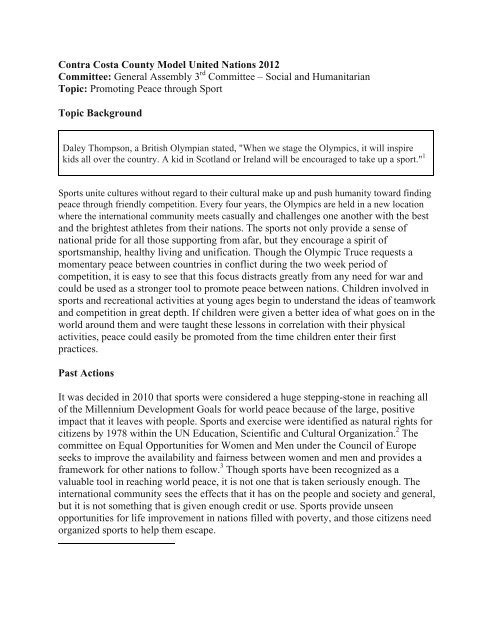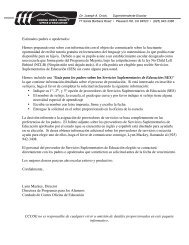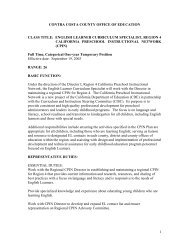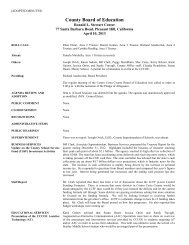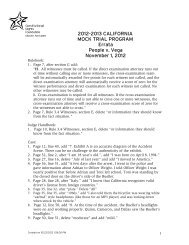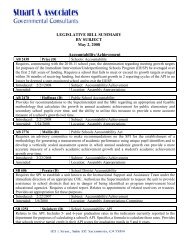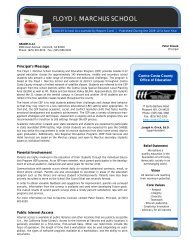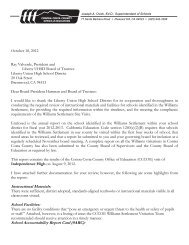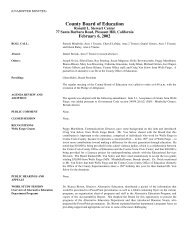General Assembly 3 Committee â Social and Humanitarian Topic
General Assembly 3 Committee â Social and Humanitarian Topic
General Assembly 3 Committee â Social and Humanitarian Topic
You also want an ePaper? Increase the reach of your titles
YUMPU automatically turns print PDFs into web optimized ePapers that Google loves.
Contra Costa County Model United Nations 2012<br />
<strong>Committee</strong>: <strong>General</strong> <strong>Assembly</strong> 3 rd <strong>Committee</strong> – <strong>Social</strong> <strong>and</strong> <strong>Humanitarian</strong><br />
<strong>Topic</strong>: Promoting Peace through Sport<br />
<strong>Topic</strong> Background<br />
Daley Thompson, a British Olympian stated, "When we stage the Olympics, it will inspire<br />
kids all over the country. A kid in Scotl<strong>and</strong> or Irel<strong>and</strong> will be encouraged to take up a sport." 1<br />
Sports unite cultures without regard to their cultural make up <strong>and</strong> push humanity toward finding<br />
peace through friendly competition. Every four years, the Olympics are held in a new location<br />
where the international community meets casually <strong>and</strong> challenges one another with the best<br />
<strong>and</strong> the brightest athletes from their nations. The sports not only provide a sense of<br />
national pride for all those supporting from afar, but they encourage a spirit of<br />
sportsmanship, healthy living <strong>and</strong> unification. Though the Olympic Truce requests a<br />
momentary peace between countries in conflict during the two week period of<br />
competition, it is easy to see that this focus distracts greatly from any need for war <strong>and</strong><br />
could be used as a stronger tool to promote peace between nations. Children involved in<br />
sports <strong>and</strong> recreational activities at young ages begin to underst<strong>and</strong> the ideas of teamwork<br />
<strong>and</strong> competition in great depth. If children were given a better idea of what goes on in the<br />
world around them <strong>and</strong> were taught these lessons in correlation with their physical<br />
activities, peace could easily be promoted from the time children enter their first<br />
practices.<br />
Past Actions<br />
It was decided in 2010 that sports were considered a huge stepping-stone in reaching all<br />
of the Millennium Development Goals for world peace because of the large, positive<br />
impact that it leaves with people. Sports <strong>and</strong> exercise were identified as natural rights for<br />
citizens by 1978 within the UN Education, Scientific <strong>and</strong> Cultural Organization. 2 The<br />
committee on Equal Opportunities for Women <strong>and</strong> Men under the Council of Europe<br />
seeks to improve the availability <strong>and</strong> fairness between women <strong>and</strong> men <strong>and</strong> provides a<br />
framework for other nations to follow. 3 Though sports have been recognized as a<br />
valuable tool in reaching world peace, it is not one that is taken seriously enough. The<br />
international community sees the effects that it has on the people <strong>and</strong> society <strong>and</strong> general,<br />
but it is not something that is given enough credit or use. Sports provide unseen<br />
opportunities for life improvement in nations filled with poverty, <strong>and</strong> those citizens need<br />
organized sports to help them escape.
2005 was identified as the International Year of Sport <strong>and</strong> Physical Education. Fourteen<br />
different NGO's worked to promote peace through sport around the world. 4 One of these,<br />
Athletes United for Peace (AUP) has worked since 1998 as an NGO through UNICEF<br />
<strong>and</strong> UNESCO. AUP spreads media supporting participation in sports <strong>and</strong> their hope for a<br />
peaceful world because of it. They also hold events <strong>and</strong> bring people together through the<br />
love of sport. 5 AUP is limited in its reach, however, <strong>and</strong> though other programs have<br />
been established to work within more areas of the international community, there is an<br />
obvious need for a greater expansion of these programs.<br />
Possible Solutions<br />
SOCHUM works under the <strong>General</strong> <strong>Assembly</strong> to analyze social, humanitarian <strong>and</strong><br />
cultural struggles within the international community, specifically in conflict zones.<br />
Sports have been widely seen as an under appreciated tool for finding peace between<br />
nations, <strong>and</strong> therefore, need to be strengthened in the eyes of the UN. There is a history,<br />
however, in a number of nations who rank high in the Olympics, whose government<br />
punishes athletes who do not perform up to par. This will be an important point in<br />
committee depending on what nations are present. This irony is one that would not be<br />
able to be maintained if sports are to be used as a universal tool toward peace. Nations in<br />
conflict or suffering from poverty also do not have the means or the proper assistance to<br />
pursue this more positive method of education. A more collective effort would have to be<br />
made in order for athletics to truly be recognized as an effective method of finding peace<br />
between nations.<br />
Sports can become so easily incorporated into a community, however, they are rarely<br />
seen as something essential to the improvement of society. This is a state of mind that<br />
must be changed. Sometimes international conflicts become so complex, it is easy to<br />
overlook the simplest <strong>and</strong> most logical tools of creating peace.<br />
Further Research<br />
Questions to consider:<br />
• How does your nation currently implement sports <strong>and</strong> athletics within society<br />
• What sort of conflicts is your country currently involved in <strong>and</strong> could sports be<br />
used in any way to promote peace<br />
• Does your nation currently work with any NGO's that support physical activity in<br />
a peaceful manner<br />
Resources:<br />
• United Nations sports for development <strong>and</strong> peace:
http://www.un.org/wcm/content/site/sport/home/unplayers/memberstates/pid/1600<br />
8<br />
• Promoting peace through sport: http://www.olympic.org/peace-through-sport<br />
• Sports <strong>and</strong> <strong>Social</strong> Change: http://www.sports<strong>and</strong>socialchange.org/<br />
i<br />
i 1 Thompson, Daley. "Olympic Quotes." About.com Quotations. N.p., n.d. Web. 19 Aug. 2012.<br />
.<br />
2 "UN Unveils New Website Promoting Peace through Sport." UN News Center. UN, 19 Feb. 2010. Web. 19 Aug.<br />
2012. .<br />
3 Council of Europe. "Parliamentary <strong>Assembly</strong>." N.p., 29 Mar. 2005. Web. 19 Aug. 2012.<br />
.<br />
4 "NGOs Who's Involved, United Nation’s International Year of Sport <strong>and</strong> Physical Education 2005." UN News<br />
Center. UN, n.d. Web. 19 Aug. 2012. .<br />
5 "Athletes United for Peace's Mission." Athletes United for Peace's Mission. N.p., n.d. Web. 19 Aug. 2012.<br />
.


